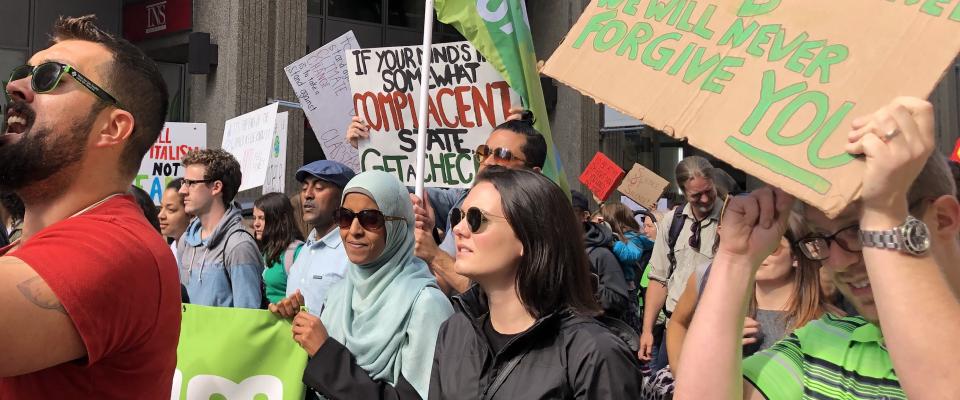Since the Rio Earth Summit in 1992, many nations have been meeting annually to discuss climate change, prompting the creation of the United Nations Framework Convention on Climate Change (UNFCCC) secretariat in 1994. Post-Kyoto Protocol, many signed the Paris Agreement (2015), a plan to combat climate change by committing to holding the increase in the global temperature to well below 2 degrees Celsius above pre-industrial levels and pursuing efforts to limit the temperature increase even further to 1.5 degrees Celsius above pre-industrial levels by 2100. To achieve this goal, the UN organizes an annual meeting, known as the Conference of the Parties (COP). The twenty-fifth COP, or 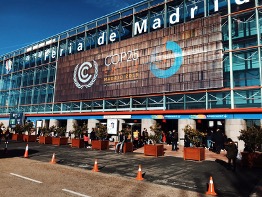 COP25, was held in Madrid in December 2019. It was originally supposed to take place in Chile but was moved to Madrid in response to the brutal repression of social unrest in Chile.
COP25, was held in Madrid in December 2019. It was originally supposed to take place in Chile but was moved to Madrid in response to the brutal repression of social unrest in Chile.
The goal is to cut greenhouse gases (GHGs) to 37.5% below pre-industrial (1990, according to the Kyoto Protocol) levels by 2030, 50% by 2050 and 100% by 2100. Documented effects of climate change include drought, an increase in the frequency and intensity of extreme weather events (hurricanes, heat waves, heavy rainfall), shoreline erosion and the spread of some vector-borne diseases.
PSAC Involvement
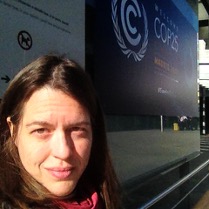 With the support of the Public Service Alliance of Canada's Social Justice Fund, in 2019 for the first time, a PSAC representative, Caroline Couture, attended COP along with CLC, FTQ and ITUC representatives. In previous years, the Social Justice Fund supported the participation of members in 2 parallel events to the COP, the Alternative forum to the COP16 in Cancun in December 2010 and the Parallel Forum “One million climate jobs” during COP17 in Durban, South Africa, 2011.
With the support of the Public Service Alliance of Canada's Social Justice Fund, in 2019 for the first time, a PSAC representative, Caroline Couture, attended COP along with CLC, FTQ and ITUC representatives. In previous years, the Social Justice Fund supported the participation of members in 2 parallel events to the COP, the Alternative forum to the COP16 in Cancun in December 2010 and the Parallel Forum “One million climate jobs” during COP17 in Durban, South Africa, 2011.
The COP conferences
COP conferences are a series of conventions on numerous topics (energy, biodiversity, agriculture and so on), sometimes held as part of thematic days but also as international negotiation sessions concerning policy for the implementation of the Paris Agreement. COPs are also an opportunity for lobbying and networking (international trade unions, government ministers, members of Parliament and opposition parties, and Quebec, Canadian and international civil society organizations). In addition to the Member States, nine constituencies, including trade unions, young people and indigenous people, take part in the discussions.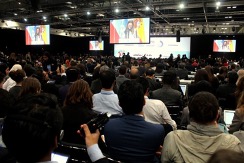
At COP25 in 2019, for example, Spain was tasked with setting up a Green Zone to encourage participation by direct action groups.
Just transition
It is becoming increasingly clear that the climate crisis calls for an economic transition, and unions and civil society demand community and worker involvement to ensure that this transition does not occur at their expense. Just transition to a zero-carbon economy that mitigates the adverse impact on employment and social equity where possible has already been defined. Its basis is social dialogue, as incorporated in the Global Shifts – Just Transitions pillar of ITUC Strategic Plan 2018-2022, alongside the pillars of Peace, Democracy and Rights; Regulating Economic Power; and Equality. The issue, therefore, is not what a just transition is, but how it is to be achieved.
Some governments signed the Just Transition Declaration, committing to striving to maintain quality jobs by, for instance, offering social protection systems and helping to train workers whose jobs and job skills are changing. The ILO developed two Skills for a Greener Future reports: the first, “Challenges and Enabling Factors to Achieve a Just Transition,” and the second, “Key Findings.” By the end of COP25, Canada had not yet signed the declaration.
Solutions
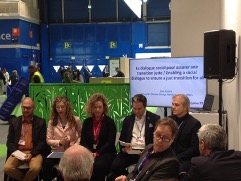 It is becoming increasingly clear that the climate crisis is, first and foremost, a social crisis. Stakeholders agree that education, youth engagement, direct action participation, local and community initiatives and empowerment are all part of the solution. More than ever must funding target adaptation and mitigation measures. The most resilient societies will be those that value cultural diversity and knowledge of traditions and subsistence strategies for populated areas and ecosystems and promote them alongside social equity values.
It is becoming increasingly clear that the climate crisis is, first and foremost, a social crisis. Stakeholders agree that education, youth engagement, direct action participation, local and community initiatives and empowerment are all part of the solution. More than ever must funding target adaptation and mitigation measures. The most resilient societies will be those that value cultural diversity and knowledge of traditions and subsistence strategies for populated areas and ecosystems and promote them alongside social equity values.
In response to the COVID-19 pandemic, hundreds of direct-action organizations have joined to endorse the Principles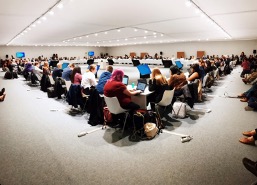 of a Just Recovery, on which governments and institutions should base their efforts to build a sustainable economy. The Principles incorporate the issues of health and wellbeing, equity, environmental protection, resilience and solidarity. In addition, the Canadian Centre for Policy Alternatives has worked with PSAC to develop an Alternative Federal Budget (AFB) Recovery Plan.
of a Just Recovery, on which governments and institutions should base their efforts to build a sustainable economy. The Principles incorporate the issues of health and wellbeing, equity, environmental protection, resilience and solidarity. In addition, the Canadian Centre for Policy Alternatives has worked with PSAC to develop an Alternative Federal Budget (AFB) Recovery Plan.
What unions can do
Climate change (and environmental concerns as a whole) encompasses economic and public health issues that directly affect members’ working conditions (financial and occupational health and safety issues) and communities’ living conditions (public health and policy decisions).
In addition to proactively protecting jobs through a just transition, unions can:
- help to train workers;
- include environmental clauses in collective agreements;
- participate in business networking (Circular Economy);
- seek opportunities for innovation;
- shift the burden of action towards organizations and governments and away from individuals.
Ultimately, of course, workers are the experts on their workplaces.
Ref.
www.quebec.ca/en/health/advice-and-prevention/health-and-environment/the-health-effects-of-climate-change
www.canada.ca/en/services/environment/weather/climatechange/causes-effects.html
 Member Login
Member Login



